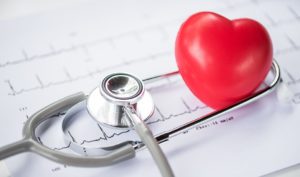Over the past 50 years, Aged Garlic Extract has been the subject of over 900 published scientific papers. Many of these are randomized, double-blind, placebo-controlled human studies—long considered the “gold standard” when it comes to research—that document the cardiovascular benefits of Aged Garlic Extract.
How does Aged Garlic Extract improve cardiovascular health?
This is one of the most common questions we get asked. Managing the various aspects of cardiovascular disease is an important part of reducing your odds of a future heart attack or stroke. Here, we break down the science of how Aged Garlic Extract (AGE) helps to support better cardiovascular health in four important and well-known areas: atherosclerosis, blood pressure, cholesterol, and circulation.
Stop Atherosclerosis with Aged Garlic Extract
Your cardiovascular system is only as healthy as the arteries that carry your blood throughout your body. Healthy arteries are flexible with a smooth, undamaged endothelium—the single layer of cells that line the inner surface of your arteries—that allows oxygen and nutrient-rich blood to flow freely to all of your organs and tissues. But over time, the effects of heredity, unhealthy habits, and age can cause the buildup of artery-damaging plaque and calcium deposits. When arteries become damaged—a condition called atherosclerosis—blood flow can eventually be hindered or even completely blocked. In extensive research, clinical trials have shown that AGE can halt and even reverse the buildup of plaque and coronary artery calcification, ultimately helping to minimize the progression of atherosclerosis.1
High blood pressure and high cholesterol can contribute to the development of atherosclerosis. High blood pressure—which is defined as 130/80 mmHg or higher—is also called “the silent killer” because it typically has no symptoms. Although this condition often flies under the radar, it can lead to serious health problems. But a growing number of studies suggest that AGE can significantly lower both systolic and diastolic blood pressure.2
AGE can help with cholesterol reduction, too. While cholesterol is important for the formation of cell membranes, and for the production of hormones, bile acids, and vitamin D, too much of the wrong kind of cholesterol can encourage the buildup of plaque in your arteries. Clinical studies show that AGE can lower total cholesterol, as well as harmful low-density lipoprotein (LDL) cholesterol levels.3
Together, these clinical studies suggest that a daily dose of AGE can work in several ways to prevent the progression of atherosclerosis, even in people at a higher risk for the condition. Read more about the health benefits of Aged Garlic Extract.
Better Blood Pressure with Aged Garlic Extract
 Technically known as hypertension—high blood pressure can significantly increase your risk of atherosclerosis, chest pain, cognitive decline, heart failure, kidney damage, peripheral artery disease, stroke, and vision problems. It also increases the likelihood of premature death. The good news? Human studies suggest that AGE can effectively lower blood pressure. During one recent study that appeared in the journal Frontiers in Nutrition, researchers from the University of Adelaide in Australia reported that AGE produced a significant drop in systolic and diastolic blood pressure compared to a placebo. 4 Another study involving 88 people with high blood pressure found even better results with a reduction of 11.5 mmHg in systolic pressure and a 6.3 mmHg drop in diastolic pressure in 58 percent of those taking AGE.5 Earlier studies have reported similar results, leading researchers to conclude that AGE offers benefits similar to first-line blood pressure medication.6 But unlike pharmaceuticals, AGE is extremely safe with few, if any, side effects.
Technically known as hypertension—high blood pressure can significantly increase your risk of atherosclerosis, chest pain, cognitive decline, heart failure, kidney damage, peripheral artery disease, stroke, and vision problems. It also increases the likelihood of premature death. The good news? Human studies suggest that AGE can effectively lower blood pressure. During one recent study that appeared in the journal Frontiers in Nutrition, researchers from the University of Adelaide in Australia reported that AGE produced a significant drop in systolic and diastolic blood pressure compared to a placebo. 4 Another study involving 88 people with high blood pressure found even better results with a reduction of 11.5 mmHg in systolic pressure and a 6.3 mmHg drop in diastolic pressure in 58 percent of those taking AGE.5 Earlier studies have reported similar results, leading researchers to conclude that AGE offers benefits similar to first-line blood pressure medication.6 But unlike pharmaceuticals, AGE is extremely safe with few, if any, side effects.
But as good as AGE is alone, it may be even more effective when paired with the enzyme nattokinase—which acts as a natural ACE inhibitor—and L-theanine—which has also been shown to lower blood pressure.7,8 Independent studies of these three nutrients support their potential to have a positive impact on blood pressure.
AGE Curtails High Cholesterol
Cholesterol is a fat-like, waxy substance that’s essential for good health. But too much of a harmful form of cholesterol known as low-density lipoprotein (LDL) can contribute to the buildup of plaque in your arteries. Clinical studies show that AGE can lower total cholesterol, as well as LDL cholesterol levels. This was clearly shown in a review of 39 human studies published in Nutrition Reviews. The researchers found that AGE reduced total cholesterol by 17 mg/dL and LDL by 9 gm/dL in people with slightly elevated cholesterol levels.9 A previous clinical trial reported that AGE lowered total cholesterol by 7% and LDL by 10% compared to a placebo.10 Adding plant sterols to AGE may also support healthy cholesterol levels even more. On their own, plant sterols were recently found to lower LDL by up to 10% in a trial of 221 people with high cholesterol levels.11
Improve Circulation with AGE
Your circulatory system is a complex superhighway made up of arteries, veins, and capillaries that carry oxygen-rich blood throughout your body. This blood delivers important nutrients to your organs and tissues and helps remove cellular waste. When the blood vessels that make up your circulatory system are healthy, blood flows freely throughout the body. But when they are damaged, the amount of blood that reaches your vital organs and extremities is reduced.
AGE has been shown to support healthy blood vessels and improve circulation in a number of ways. It promotes clear arteries by discouraging calcium deposits and plaque buildup. In addition, AGE lowers blood pressure and cholesterol levels. Clinical research shows that AGE also reduces oxidation and inflammation, and increases the production of nitric oxide (a molecule that dilates blood vessels for better blood flow).12,13,14
AGE also works on the microcirculatory system—that network of tiny capillaries, arterioles, and venules that moves blood from larger blood vessels to your cells. This was shown in a recent study published in the International Wound Journal. Among 122 people who took part in the study, those who supplemented with AGE for a year had better microcirculation than those taking a placebo. This was especially true among the participants with an increased risk of heart attack or stroke.15 These findings are good news for anyone with cardiovascular issues and especially for diabetics since microcirculation can be compromised in people with type 2 diabetes.
What is the best exercise for cardiovascular health?

Strengthening your heart is one of the best things you can do to improve your cardiovascular health. And a great way to do this is through exercise! Experts recommend spending at least 150 minutes per week doing moderate physical activity. Because aerobic exercise, also known as “cardio,” increases your heart rate while also improving your blood pressure, it’s the most beneficial type of exercise for your cardiovascular health.16 Regular cardio workouts can help strengthen your heart and blood vessels, improve the flow of oxygen throughout your body, lower your blood pressure, and more. Walking is a great form of cardio—you just want to make sure to move at a nice quick pace (think power walking). Walking at a brisk pace will get your heart rate up and is easier on your joints than most other types of exercise. You can listen to a podcast or your favorite tunes while you walk and the time will fly by! Swimming is another good option, one that’s also easy on the joints. Try taking a water aerobics class—it can provide a great full-body workout that not only strengthens your body but your heart, too. Lastly, cycling is also a great way to get your heart rate up. Haven’t been on a bike for years? Consider signing up for a spin class.
How else can you improve your cardiovascular health?
Want additional ways to improve your cardiovascular health? Here are a few more tips that can help you show your heart some love.
Be mindful of your diet. A diet rich in a variety of colorful fruits and veggies is linked to healthier hearts and a lower risk of heart disease.17 In addition, we recommend switching to whole grains, which means they will have more nutrients like dietary fiber, B vitamins, vitamin E, and healthy fats. It’s also important to take time to read nutrition labels. This can help you avoid foods high in sodium and unhealthy trans fats.
Watch your portions. Eating fruits, veggies, and whole grains is great, but if you’re eating twice the proper portion size (or more!), you aren’t doing yourself any favors. One easy way to downsize your portions is to eat off a smaller plate. The average dinner plate today is around 12 inches, so try switching to a slightly smaller plate, maybe about 8 inches. This will help you to keep better track of the food you’re eating. Plus a smaller plate will make your portions actually look larger.
Get enough sleep. Sleep is important for a healthy heart. In fact, people who don’t get enough quality sleep are at greater risk for cardiovascular disease and coronary artery disease.18 The quality and quantity of sleep you get also affects your energy levels the next day. Adopt a regular bedtime and stick to it. This will help you get the recommended seven to nine hours of sleep per night.
Manage stress. Stress can raise your blood pressure, so it is crucial to find ways to unwind. Exercising and getting enough sleep can help relieve tension. It’s also important to try and set aside at least 15 minutes of quiet time every day to relax.
What foods do cardiologists say to avoid?
Cardiologists see first-hand what a bad diet can do to your heart. Here are some foods that they say to limit for optimal heart health.
Bacon, sausage, and other processed meats. Processed meats have been linked to an elevated risk of coronary artery disease.19 Plus, these foods are high in calories, saturated fat, salt, and sometimes have added ingredients like nitrates.
Potato chips and other processed/packaged snacks. Stay away from those crunchy, salty carbs. They taste good but they can be addicting—and these simple carbs aren’t the best for a healthy heart. Cardiologists recommend reaching for apples, carrots, and whole-grain snacks instead.
Too much protein. Scientists have made a connection between those popular high-protein diets and the risk of developing cardiovascular disease.20 Strive to limit your protein intake to the recommended amount of 0.8 grams of protein per kilogram of body weight per day. For someone weighing 150 pounds, that would total about 55 grams of protein daily.
Alcohol. Moderate drinking—no more than one to two drinks per day—won’t harm your heart unless you have high blood pressure or high triglycerides (a type of fat in your blood that can boost your odds of heart disease). Heavy drinking, on the other hand, can lead to a higher risk of high blood pressure, heart failure, stroke, and weight gain.21
By adopting these heart-healthy habits and supplementing with Aged Garlic Extract, you can give your cardiovascular system the tools it needs to keep beating strong for a lifetime. Want even more cardio-smart strategies? Bookmark our resource section at kyolic.com.
Disclaimer: The scientific studies described here were conducted by independent researchers and presented for educational purposes only. The products of the studies may be classified as dietary supplements in the United States. Those dietary supplements are not intended to diagnose, treat, cure or prevent any disease.
References
- Wlosinska M. The effect of aged garlic extract on the atherosclerotic process – a randomized double-blind placebo-controlled trial. BMC Complementary Medicine and Therapies. 2020;20(1):132.
- Ried K. Aged garlic extract reduces blood pressure in hypertensives: a dose-response trial. European Journal of Clinical Nutrition. 2013;67(1):64-70.
- Ried K. Effect of garlic on serum lipids: an updated meta-analysis. Nutrition Reviews. 2013;71(5):282-99.
- Ried K. The Effect of Kyolic Aged Garlic Extract on Gut Microbiota, Inflammation, and Cardiovascular Markers in Hypertensives: The GarGIC Trial. Frontiers in Nutrition. 20181;5:122.
- Ried K. The effect of aged garlic extract on blood pressure and other cardiovascular risk factors in uncontrolled hypertensives: the AGE at Heart trial. Integrated Blood Pressure Control. 2016;9:9-21.
- Tiago MS. Effect of aged garlic extract on blood pressure and other cardiovascular markers in hypertensive patients and its relationship with dietary intake. Journal of Functional Foods. 2024;112:105931.
- Jensen GS. Consumption of nattokinase is associated with reduced blood pressure and von Willebrand factor, a cardiovascular risk marker: results from a randomized, double-blind, placebo-controlled, multicenter North American clinical trial. Integrated Blood Pressure Control. 2016;9:95-104.
- Yoto A. Effects of L-theanine or caffeine intake on changes in blood pressure under physical and psychological stresses. Journal of Physiology and Anthropology. 2012;31(1):28.
- Ried K. Effect of garlic on serum lipids: an updated meta-analysis. Nutrition Reviews. 2013;71(5):282-99.
- Yeh YY. Cholesterol-lowering effect of garlic extracts and organosulfur compounds: human and animal studies. Journal of Nutrition. 2001;131(3s):989S-93S.
- Cabral Phytosterols in the treatment of hypercholesterolemia and prevention of cardiovascular diseases. Arquivos Brasileiros de Cardiologia. 2017;109(5):475-82.
- Lau BH. Suppression of LDL oxidation by garlic. Journal of Nutrition. 2001;131(3s):985S-8S.
- Zeb I. Aged garlic extract and coenzyme Q10 have favorable effect on inflammatory markers and coronary atherosclerosis progression: A randomized clinical trial. Journal of Cardiovascular Disease Research. 2012;3(3):185-90.
- Morihara N. Aged garlic extract enhances production of nitric oxide. Life Sciences. 2002;71(5):509-17.
- Wlosinska M. Aged garlic extract preserves cutaneous microcirculation in patients with increased risk for cardiovascular diseases: A double-blinded placebo-controlled study. International Wound Journal. 2019;16(6):1487-93.
- Murray KO. Aging, aerobic exercise, and cardiovascular health: Barriers, alternative strategies and future directions. Experimental Gerontology. 2023;173:112105.
- Juraschek SP. Associations between dietary patterns and subclinical cardiac injury: an observational analysis from the DASH Trial. Annals of Internal Medicine. 2020;172(12):786-94.
- Nagai M. Sleep duration as a risk factor for cardiovascular disease- a review of the recent literature. Current Cardiology Reviews. 2010;6(1):54-61.
- Micha R. Red and processed meat consumption and risk of incident coronary heart disease, stroke, and diabetes mellitus: a systematic review and meta-analysis. Circulation. 2010;121(21):2271-83.
- Zhang X. High-protein diets increase cardiovascular risk by activating macrophage mTOR to suppress mitophagy. Nature Metabolism. 2020;2(1):110-25.
- Husain K. Alcohol-induced hypertension: Mechanism and prevention. World Journal of Cardiology. 2014;6(5):245-52.
This article is for informational purposes only. This article is not, nor is it intended to be, a substitute for professional medical advice, diagnosis, or treatment and should never be relied upon for specific medical advice.

Share this Post